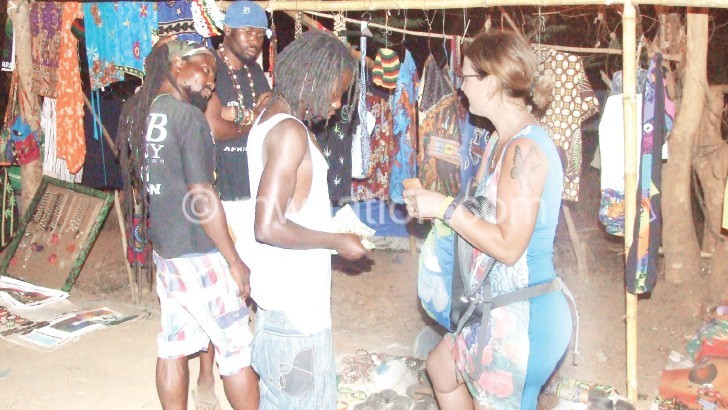Lake of stars winners, losers
On this night, there were no stars in the sky shinning on the waters of Lake Malawi—christened ‘Lake of Stars’ by missionary explorer Dr David Livingstone. Instead, the stars that illuminated the night were artists on stage to mark the return of Lake of Stars (LoS) arts festival to Chintheche Inn in Nkhata Bay last weekend.
The main headline act was South Africa’s group Freshlyground. They came and impressed with their various chart-topping hits, including Waka Waka and Doo Be Doo. They returned without blemish as the official 2010 Fifa World Cup song done with Shakira rekindled fond memories.
The local artists were not a shadow of themselves though. The likes of Lusubilo Band, Patience Namandingo and Faith Mussa proved to be a force to reckon with in real traditional music. They left fans satisfied with traditional aspects that were incorporated into their music.

Now, the 2016 Lake of Stars arts festival is gone, done and dusted. However, the festival’s homecoming has had winners and losers; the good and the bad—something that will live with the community after music, drums and dance fade away in the ears and memory of gig-goers.
Revellers living around the scenic lakeshore district cherished the homecoming, but for the majority of locals around the venue say the return has not lived up to their expectations.
The Lake of Stars last took place at Chintheche in 2007. Thereafter, it moved to Sunbird Livingstonia in Salima and Sunbird Nkopola in Mangochi with a one-off appearance in Lilongwe as the City of Stars in 2013.
A representative of the locals at Chintheche Rasta Kelvin Mujuliyeni says locals have failed to benefit more from the festival than in the four years of the festival at the beach since 2004.
Mujuliyeni says the locals were sidelined by organisers in the planning process prior to the festival. As such, he says the locals were denied an opportunity to trade around the venue.
“It was up until three days before the event that we were allowed. By then, it was already too late to plan for business and erect proper structures, including pit latrines. In the end, we lost a lot of business as we were taken by surprise,” says Mujuliyeni who owns One Love Local Restaurant and Art Shop.
He says this is unlike in the past when locals were free to trade at the venue and rake in thousands of money because sales would go up more than double.
“When Lake of Stars left in 2004, we were complaining because we thought we could not benefit anymore from the business they were offering us. I used to benefit up to 80 percent in sales.
“But its return has not been any better. My sales have gone up with a mere 25 percent,” he said.
Mujuliyeni suggests that in future Lake of Stars should consider having one-stop market rather than sidelining locals with exorbitant prices.
“Most of us failed to trade inside the venue due to limitations on prices. We couldn’t manage to cough K100 000 to book for space. In the end, it benefited only those with big business; therefore, sidelining us in the process,” he says.
Despite such an outcry, patrons who travelled from Karonga, Mzimba, Mzuzu and Rumphi feel the return of the festival to its roots was worthwhile.
Mzuzu-based Adamson Nyemera says the North felt sidelined when the festival was taking place in Mangochi due to travel budget constraints; thereby, rendering the whole event a Southern Region affair.
“Organisers should continue rotating the event so that fun-seekers in all parts of the country are given equal chances to attend. In the past, very few people from the North would travel all the way to Mangochi. But this year, I can recognise a lot of faces from Mzuzu.
This needs to be encouraged,” he says.
On the set-up of the festival, Joseph Chifamba who travelled from Zimbabwe says the festival needs to do more in promoting Malawian traditions.
“Those of us from outside Malawi, especially those from Europe, came to sample Malawian culture. So, it defeats the whole purpose of a festival to have acts that imitate European music.
“The best way to improve on that is to dedicate one of the stages to traditional acts throughout the three days of the festival,” says Chifamba.
He, however, says that should not stop the organisers from inviting internationally-acclaimed musicians to headline the event.
“They can have one or two famous international artists just to help in pulling more patrons. But the focus of the festival in general should be in exposing and promoting Malawian traditions, including food and dance,” he says.
Last year, the festival pooled together 4 500 patrons with over 80 acts on three stages. This year, Lake of Stars founder Will Jameson says they have managed to have 2 500 patrons with 60 acts on two stages.
Jameson, however, insists the return has been better.
“It is completely wrong to say the event this year was not better than last year. In terms of business, we had more vendors than before. We had seven food vendors against last year’s five and 20 non-food vendors against last year’s 12.
“On patronage, we had a few less numbers from Blantyre, but we had a few more people coming from Mzuzu. So, it was balanced. Even the stages, last year we had three stages, but only two were operating at the same time. Here, we have the A4AY Main Stage, the Airtel Beach Stage and the Deck for late night sessions with DJs. We could even say we have three stages,” he says.
On the issue of local involvement to trade at the festival, Jameson says they were charging K100 000 to cater for water, electricity and space. n





